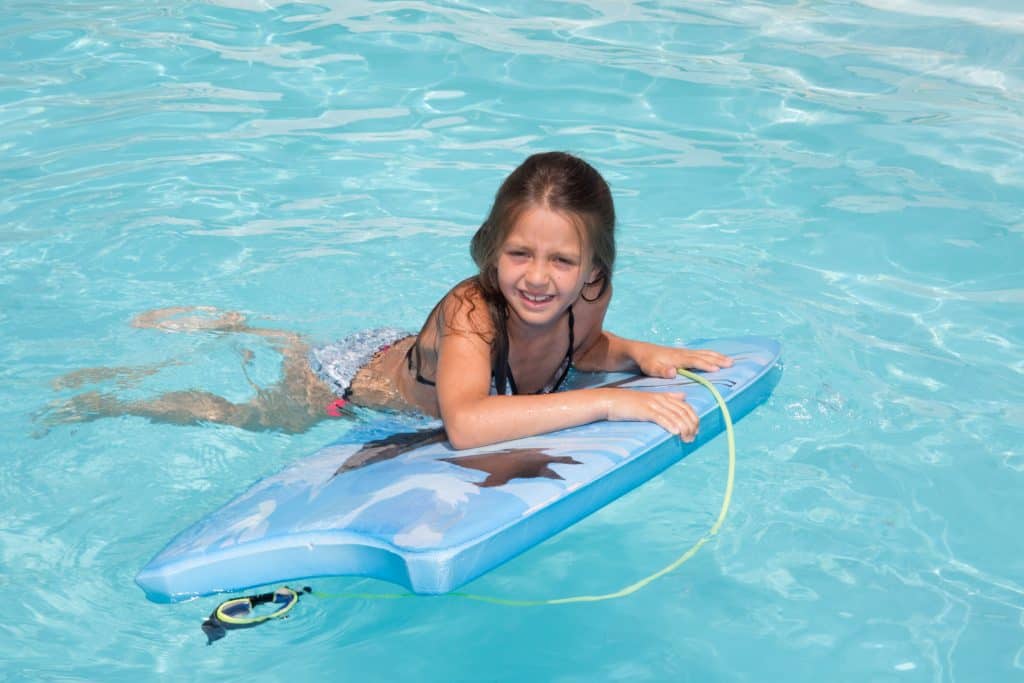
Going to the beach is a super fun activity to do with your family and friends especially at age 7. You get to sunbathe, make sandcastles, play in the water, run around on the sand, and even boogie board! But, in order to boogie board, you need to have the right-sized board.
What size bodyboard fits a 7-year-old? According to the average-sized 7-year-old, about 4 feet tall and 50 lbs., your kid will need a 32″ or 34″ board. The difference just depends on how big or small your kid is. I would suggest getting the bigger size so that your kid can still use it when they grow.
If your kid is not exactly an average size, you may need help figuring out how to find the correct size bodyboard for them. Another question to consider when you are in the market for a bodyboard is what the best brands or types are for your 7-year-old as well.
Keep reading to figure out exactly what you need.
How to Size a Bodyboard
When sizing a bodyboard, no matter how young or old you are, all you will need to know in order to figure out your perfect bodyboard size is your height and your weight. With these numbers, you can go to the chart I have provided below to figure out exactly what size you will need.
You will simply have to match it up with on the chart and it will give you the exact board size you need.
| W | e | i | g | h | t | ||||
| 40 lbs. | 60 lbs. | 80 lbs. | 100 lbs. | 120 lbs. | 140 lbs. | 160 lbs. | 180 lbs. | ||
| 6′ 6″ | 44″ | 44″- 45″ | |||||||
| 6′ 4″ | 43″- 43.5″ | 43″- 43.5″ | 43″- 44″ | ||||||
| 6′ 2″ | 42.5″ | 42.5″- 43″ | 43″- 43.5″ | ||||||
| H | 6′ | 42″ | 42″ | 42.5″ | |||||
| e | 5′ 10″ | 41″ | 41″ | 41.5″- 42″ | 42″- 42.5″ | ||||
| i | 5′ 8″ | 39″ | 40″ | 41″ | 41.5″ | 42″ | |||
| g | 5′ 6″ | 39″ | 40″ | 40″ | 41″ | 41.5″ | |||
| h | 5′ 4″ | 38″ | 39″ | 40″ | 40″ | 41″ | |||
| t | 5′ 2″ | 36″- 38″ | 38″ | 38″ | 39″ | 39″ | 39″ | ||
| 5′ | 33″ | 34″ | 36″ | 36″ | 36″ | 36″ | 36″ | ||
| 4′ 6″ | 32″ | 34″ | 36″ | 36″ | 36″ | ||||
| 4′ or under | 32″ | 34″ | 34″ |
This chart information is thanks to the courtesy of ebodyboarding.com.
What Are the Best Bodyboards?
A few of the best bodyboard brands for kids are Wave Weapon, Lucky Bums, and Bo-Toys. These brands are decently priced, good quality, and durable.
Wave Weapon
This Wave Weapon is the Best Seller on Amazon. It comes with a leash and fin tethers. It has an assortment of color options to choose from as well. It is a very good build with a smooth plastic bottom and a foam frame. This board cost about $40 depending on where you get it at. It is a great price for such a great quality board. This board has a 4.5-star rating out of 5 stars with roughly 260 customer reviews. I would highly recommend this board! It would make a great birthday present, Christmas present, Easter present, or just getting it for fun to use over the summer!
Lucky Bums
The Lucky Bums board is another great board to get for such purposes. It has an assortment of colors to choose from. It also comes with a leash, so that you don’t lose your board in the ocean when you wipe out. It has a very durable, good quality construction. This board is a foam base with a slick plastic bottom. It is built to have extreme ease of control in the water and have increased speeds. It costs about $40 on Amazon depending on where you get it from which is a great price for this board as well. This board has 3.2-star rating out of 5 stars on amazon with 572 customer reviews submitted.
Bo-Toys
The Bo-Toys bodyboard is another great board you can find on Amazon. It has a lightweight build with great maneuverability and increased strengths. This board is super durable and is water-resistant. The board comes with leah and wristband so that you won’t lose your board when you wipe out. It costs roughly $33 on Amazon, a great price for a quality board. This board has a 3.7-star rating out of 5 stars with 114 customer review submissions.
Related Questions:
What’s the right size helmet for a 7-year-old? A 7-year-old of average size will need a helmet that is about 53 cm in circumference. It is best to get the adjustable ones so that you don’t have to buy a new helmet every single time your child grows.
What’s the right size baseball glove for a 7-year-old? A 7-year-old will need a baseball glove that is about 10.25″ to 12.25″ in size. This size range should fit any 7-year-old. This size will help your 7-year-old have the best mobility and usability of his or her glove in their sport.